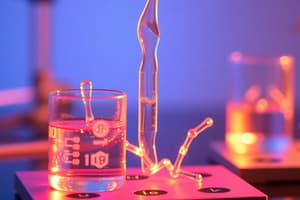Podcast
Questions and Answers
What type of electrolytes completely dissociate in ions?
What type of electrolytes completely dissociate in ions?
- Insulators
- Strong electrolytes (correct)
- Conductors
- Weak electrolytes
Which type of conductors allow electricity to pass through but do not completely dissociate in ions?
Which type of conductors allow electricity to pass through but do not completely dissociate in ions?
- Metals (correct)
- Semiconductors
- Weak electrolytes
- Strong electrolytes
In an electrochemical cell, at which electrode does oxidation occur?
In an electrochemical cell, at which electrode does oxidation occur?
- Zinc rod
- Cathode
- Anode (correct)
- Electrolyte
What does electrode potential refer to in an electrochemical cell?
What does electrode potential refer to in an electrochemical cell?
What creates a potential difference known as non-adjacent electro potential in an electrochemical cell?
What creates a potential difference known as non-adjacent electro potential in an electrochemical cell?
Which type of conductors conduct current due to the flow of ions?
Which type of conductors conduct current due to the flow of ions?
What occurs at the cathode in an electrochemical cell?
What occurs at the cathode in an electrochemical cell?
What is the classification of substances that partially allow electricity to pass through?
What is the classification of substances that partially allow electricity to pass through?
Which type of electrolytes have less than 100% dissociation?
Which type of electrolytes have less than 100% dissociation?
What type of conductors conduct current due to the flow of electrons?
What type of conductors conduct current due to the flow of electrons?
What refers to the ability of a substance to lose electrons in an electrochemical cell?
What refers to the ability of a substance to lose electrons in an electrochemical cell?
What is the process that occurs at the anode in an electrochemical cell?
What is the process that occurs at the anode in an electrochemical cell?
Which type of conductors do not allow electricity to pass through?
Which type of conductors do not allow electricity to pass through?
Which substances completely dissociate in ions as electrolytes?
Which substances completely dissociate in ions as electrolytes?
Flashcards are hidden until you start studying
Study Notes
- The video is about a 30-minute revision of the Electrochemistry chapter, emphasizing its importance in scoring well in exams.
- It covers topics like electrolytes, electrochemical cells (electrolytic and galvanic cells), conductors (metals and electrolytes), and factors affecting the conductivity of electrolytic conductors.
- Strong electrolytes completely dissociate in ions, while weak electrolytes have less than 100% dissociation.
- Conductivity of substances can be classified as conductors (allow electricity to pass through), insulators (do not allow electricity to pass through), and semiconductors (partially allow electricity to pass through).
- Metallic conductors conduct current due to the flow of electrons, while electrolytic conductors conduct current due to the flow of ions.
- In an electrochemical cell, oxidation occurs at the anode (negative charge) and reduction occurs at the cathode (positive charge).
- Electrode potential refers to the ability of an electrode to gain or lose electrons, with a potential difference between two metals creating an electrochemical cell.
- Zinc rod in zinc sulfate solution creates a potential difference known as non-adjacent electro potential.
- Oxidation potential refers to the ability of a substance to lose electrons, while reduction potential refers to the ability to gain electrons in an electrochemical cell.
Studying That Suits You
Use AI to generate personalized quizzes and flashcards to suit your learning preferences.




